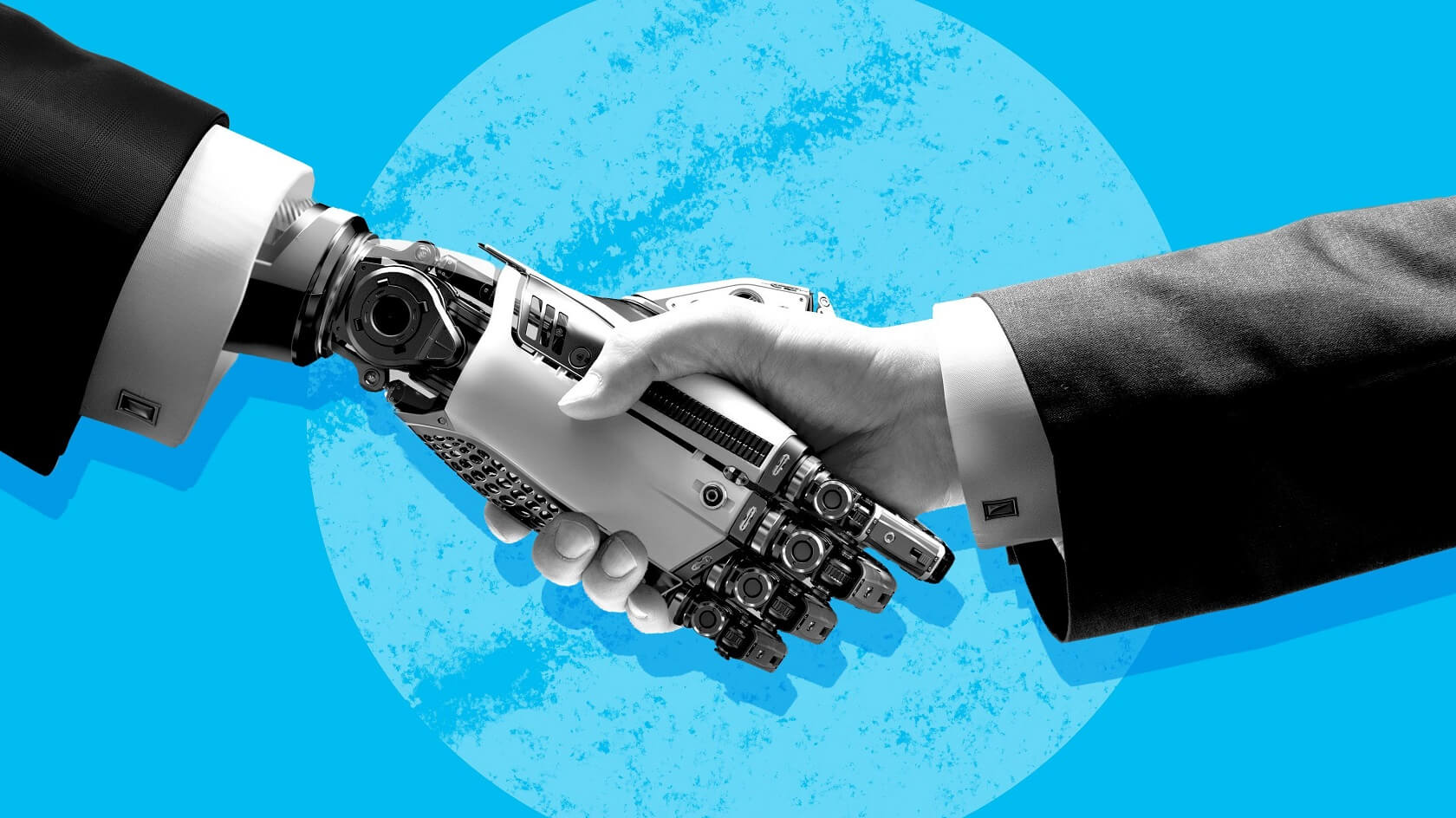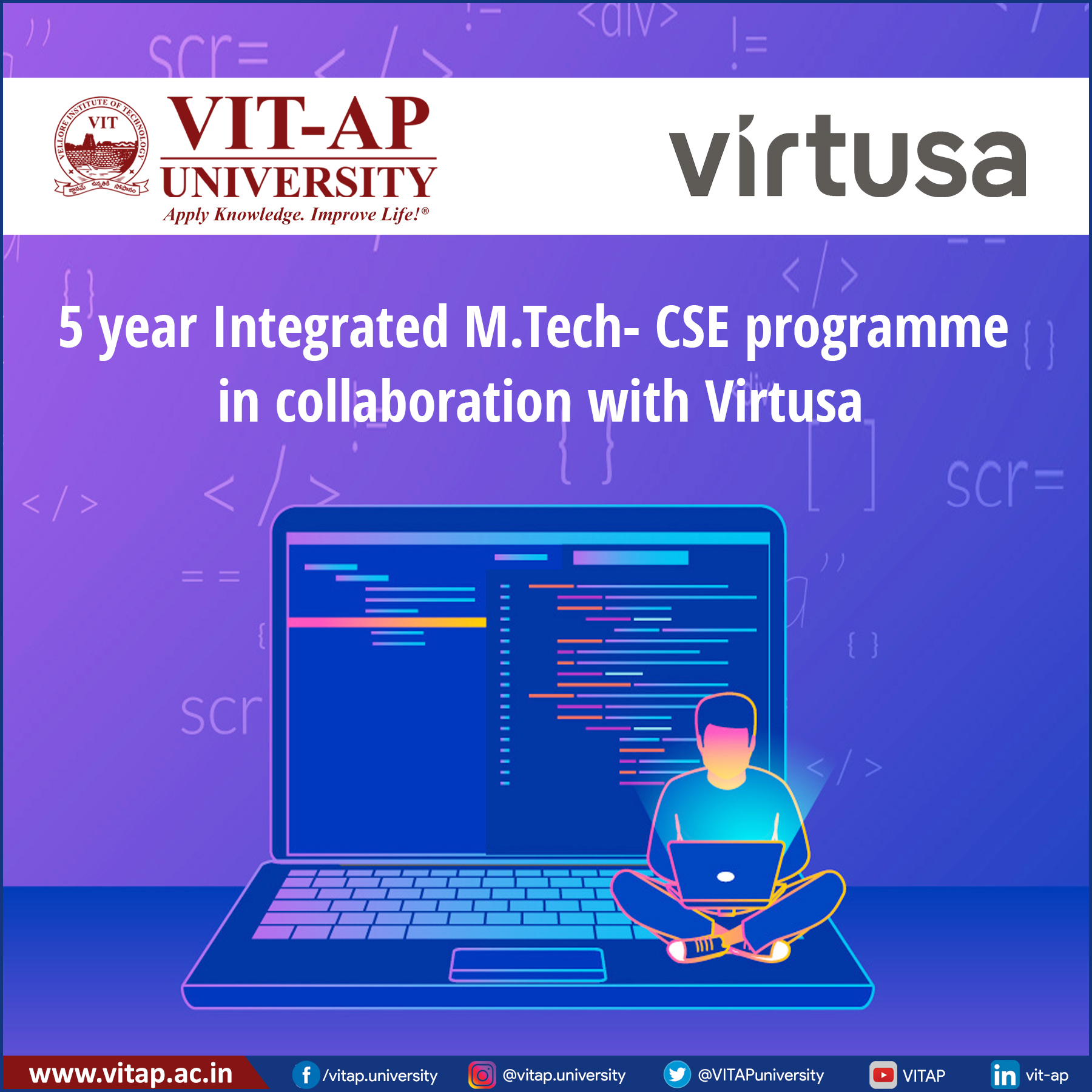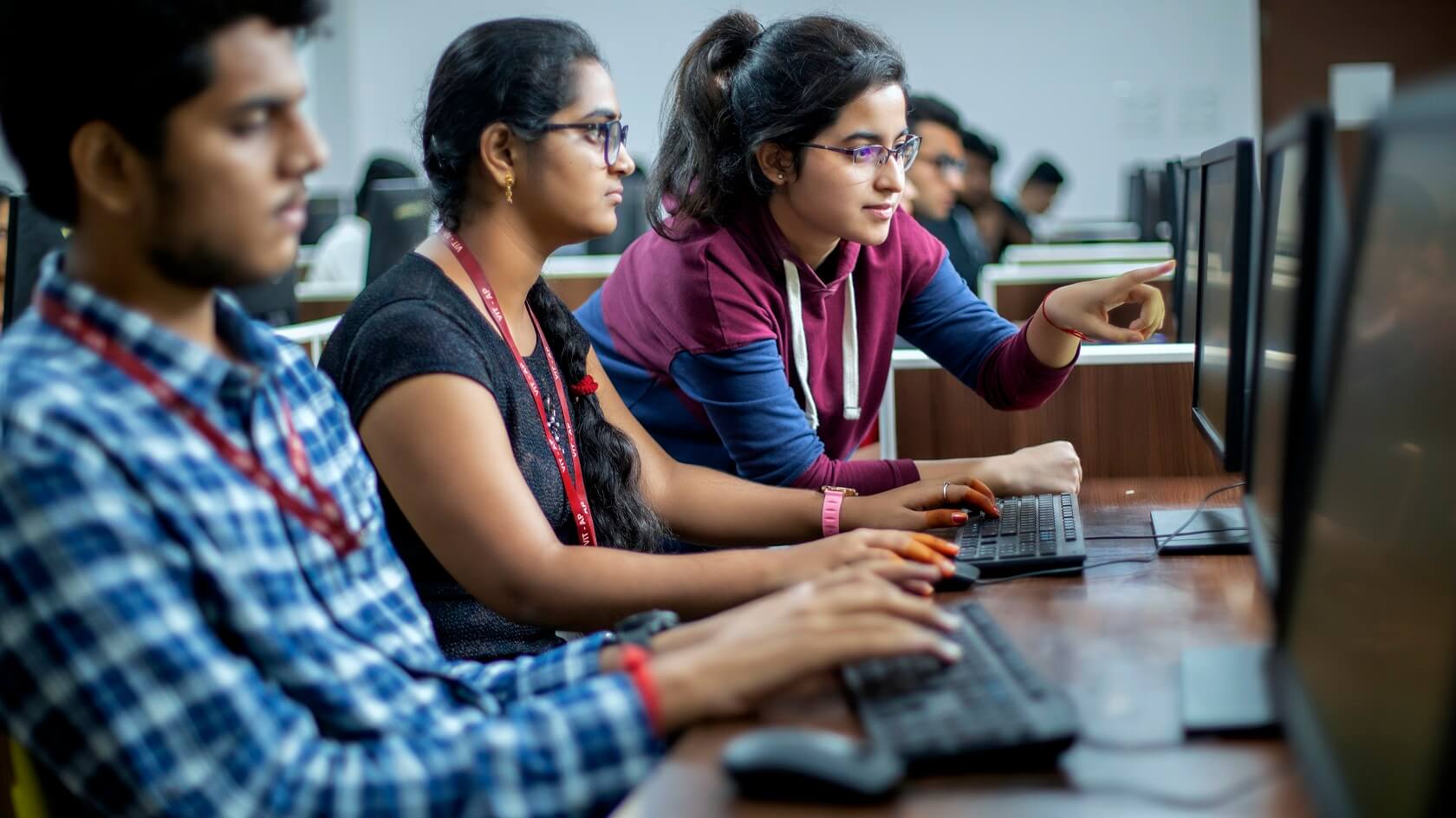
About the Programme
The School of Computer Science and Engineering proudly offers a cutting-edge B. Tech program in Software Engineering. This program is designed to equip students with a comprehensive understanding of software development principles, methodologies, and practices to meet the evolving demands of the industry.
Program Highlights
- Core Software Engineering Principles: The curriculum emphasizes fundamental concepts such as software design, development, testing, and maintenance. Students will gain a solid foundation in programming languages, software architecture, and system analysis.
- Specialization Tracks: The program offers various specialization tracks, allowing students to tailor their education based on their interests and career goals. Specializations include Software Development, DevOps, Cybersecurity, and more.
- Practical Application and Projects: Students will engage in hands-on projects and laboratory work to apply theoretical knowledge to real-world scenarios. This experiential learning approach ensures that graduates are well-prepared to tackle challenges in the field.
- Interdisciplinary Approach: Acknowledging the interdisciplinary nature of software engineering, the curriculum integrates elements from computer science, mathematics, and business. This ensures that graduates possess a holistic skill set suitable for diverse industry requirements.
- Research Opportunities: The program encourages participation in research projects, fostering collaboration not only within the department but also with other departments and external institutions. Students have the chance to explore emerging trends and contribute to the advancement of software engineering.
Core Focus Areas
- Software Development Lifecycle: Understanding the end-to-end process of software development, including requirements gathering, design, coding, testing, and maintenance.
- Agile and DevOps Practices: Emphasizing modern methodologies such as Agile and DevOps to enhance collaboration, efficiency, and continuous improvement in software development.
- Software Security: Addressing cybersecurity concerns through courses dedicated to secure coding practices, threat modeling, and vulnerability assessments.
- Database Management: Providing expertise in designing and managing databases, a crucial aspect of software engineering for data-driven applications.
Eligibility
- The applicant should be a Resident / Non-Resident Indian National / PIO / OCI.
- NRI applicants can directly apply under ‘NRI Category’ through NRI application form. (https://vit.ac.in/admissions/international/overview)
- Foreign applicants who studied/studying abroad can apply directly through the International application form.(Will be available shortly)
- Applicants whose date of birth falls on or after 1st July 2002 are eligible to apply for Engineering admission 2024.
- The date of birth as recorded in the High School / SSC / X Certificate will be considered authentic.
- Applicants should produce this certificate in original as proof of their age at the time of counseling/admission, failing which their candidacy for admission will be disqualified.
Application Process
Fee
FEE STRUCTURE |
|
|---|---|
| Tuition Fees (Per Annum) | INR 1,95,000 * |
| Caution Deposit (Refundable) | INR 3,000 |
| Total fees to be paid for first year | INR 1,98,000 |
(*after concession)
Key Features
- Well-Designed Curriculum & Course Structure: The curriculum has been designed as per the latest industry demands.
- Choice Based Credit System (CBCS): Students have the option to choose program electives based on their interests.
- Academic Flexibility: TStudents have the option to choose open electives from other domains (other than computer science) with the aim to enhance their skills and more scope of taking up case studies, projects, assignments, and vocational training including entrepreneurship.
- Holistic Development of Students: Technical Clubs like Robotics Club, IEEE Students’ chapter, IE(I) and ICEIT chapters, etc. allow the students to learn and update themselves with the latest technologies and showcase their abilities in various fields, outside their scope of the study.
- Placements: Placements assistance (Mock Drives/Interviews), Internships Assistance, Placement classes by the expert team of Training and Placement.
Career Prospectus
Graduates of the B.Tech program in Software Engineering will be well-prepared for various roles in the software industry, including software development, systems analysis, quality assurance, and project management. They will possess the skills needed to adapt to rapidly changing technologies, innovate in software solutions, and contribute significantly to the advancement of the field. The interdisciplinary nature of the program ensures that graduates are versatile and ready to excel in diverse industries and domains.
Design Your Own Degree (DYOD)
- ★ Students are given options to select either a Specialization or Minor along with their choice of B.Tech. Major during counselling
- ★ A student is allowed to change his/her choice of Specialization or Minor after the completion of first year in the University as per their evolving interests
- ★ A student can also choose to do a Double Major instead of Specialization or Minor starting second year
Specialization | Minors | Double Major |
|---|---|---|
Artificial Intelligence and Machine Learning | VLSI | Electronics & Communication Engineering |
Data Analytics | Image and Video Processing | Mechanical Engineering |
Cyber Security | Embedded Systems | Applied Science |
Edge Computing | Internet of Things (IoT) | Business Management |
Software Engineering | Electronics & Comm. Engineering | Economics |
Geo Informatics | Electric Vehicle Technology | Digital Humanities |
Blockchain | Digital Manufacturing | Media and Communication |
Automotive Design | ||
Robotics | ||
Mechanical Engineering | ||
FinTech | ||
Digital Marketing | ||
Econometrics | ||
Performing Arts | ||
Computational Mathematics | ||
Corporate Law |
Know Your Opportunity
B.Tech graduates in software engineering have a wide range of career opportunities across various industries. Here are some potential career paths for B.Tech software engineering graduates:
- ★ Software Developer/Engineer: Software developers design, develop, test, and maintain software applications and systems. They may specialize in areas such as web development, mobile app development, desktop application development, or embedded systems development.
- ★ Full-Stack Developer: Full-stack developers have expertise in both front-end and back-end development. They work on building the entire stack of a web application, including the user interface, server-side logic, and database interactions.
- ★ DevOps Engineer: DevOps engineers focus on optimizing the software development lifecycle by implementing automation, continuous integration/continuous deployment (CI/CD) pipelines, infrastructure as code (IaC), and monitoring solutions to improve efficiency, reliability, and scalability.
- ★ Data Scientist/Engineer: Data scientists and engineers analyze large datasets to extract insights, build predictive models, and solve business problems. They use tools and techniques such as machine learning, data mining, statistical analysis, and data visualization.
- ★ Cloud Engineer: Cloud engineers design, deploy, and manage cloud infrastructure and services on platforms such as Amazon Web Services (AWS), Microsoft Azure, or Google Cloud Platform (GCP). They work on tasks such as cloud migration, scaling applications, and optimizing performance and cost.
- ★ Cybersecurity Analyst/Engineer: Cybersecurity professionals focus on protecting computer systems, networks, and data from cyber threats. They analyze security risks, implement security measures, conduct penetration testing, and respond to security incidents.
- ★ Quality Assurance (QA) Engineer: QA engineers are responsible for testing software applications to ensure they meet quality standards and perform as expected. They develop test plans, write test cases, perform manual and automated testing, and report bugs.
- ★ UI/UX Designer: UI/UX designers create user interfaces and experiences for software applications. They design wireframes, mockups, and prototypes, conduct user research, and ensure that applications are intuitive, user-friendly, and visually appealing.
- ★ Project Manager: Project managers oversee software development projects from initiation to completion. They coordinate team members, manage budgets and schedules, communicate with stakeholders, and ensure that projects are delivered on time and within budget.
- ★ Entrepreneurship: B.Tech software engineering graduates also have the option to start their own software development companies or tech startups. They can develop innovative software products, solutions, or services and bring them to market.
The field of software engineering is dynamic and diverse, offering a wide range of roles and opportunities for growth and advancement.
Programme Outcomes
1. Engineering knowledge: Apply the knowledge of mathematics, science, engineering fundamentals and an engineering specialization to the solution of complex engineering problems.
2. Problem analysis:Identify, formulate, review research literature, and analyze complex engineering problems reaching substantiated conclusions using first principles of mathematics, natural sciences and engineering sciences.
3. Design/development of solutions: Design solutions for complex engineering problems and design system components or processes that meet the specified needs with appropriate consideration for the public health and safety, and the cultural, societal, and environmental considerations.
4. Conduct investigations of complex problems: Use research–based knowledge and research methods including design of experiments, analysis and interpretation of data, and synthesis of the information to provide valid conclusions.
5. Modern tool usage: Create, select, and apply appropriate techniques, resources, and modern engineering and IT tools including prediction and modeling to complex engineering activities with an understanding of the limitations.
6. The engineer and society: Apply reasoning informed by the contextual knowledge to assess societal, health, safety, legal and cultural issues and the consequent responsibilities relevant to the professional engineering practice.
7. Environment and sustainability: Understand the impact of the professional engineering solutions in societal and environmental contexts, and demonstrate the knowledge of, and need for sustainable development.
8. Ethics: Apply ethical principles and commit to professional ethics and responsibilities and norms of the engineering practice.
9. Individual and teamwork: Function effectively as an individual, and as a member or leader in diverse teams, and in multidisciplinary settings.
10. Communication: Communicate effectively on complex engineering activities with the engineering community and with society at large, such as, being able to comprehend and write effective reports and design documentation, make effective presentations, and give and receive clear instructions.
11. Project management and finance: Demonstrate knowledge and understanding of the engineering and management principles and apply these to one’s own work, as a member and leader in a team, to manage projects and in multidisciplinary environments.
12. Life–long learning: Recognize the need for, and have the preparation and ability to engage in independent and life–long learning in the broadest context of technological change.
Programme Educational Objectives
PEO1: Graduates will be engineering practitioners and leaders, who would help solve industry‘s technological problems.
PEO2: Graduates will be engineering professionals, innovators or entrepreneurs engaged in technology development, technology deployment, or engineering system implementation in industry.
PEO3: Graduates will function in their profession with social awareness and responsibility.
PEO4: Graduates will interact with their peers in other disciplines in industry and society and contribute to the economic growth of the country.
PEO5: Graduates will be successful in pursuing higher studies in engineering or management.
PEO6: Graduates will pursue career paths in teaching or research.
Programme Specific Outcome
PSO1: Design and develop intelligent automated systems applying mathematical, analytical, programming and operational skills to solve real world problems.
PSO2: Apply machine learning techniques, software tools to conduct experiments, interpret data and solve complex problems.
PSO3: Implement engineering solutions for the benefit of society by the use of software architecture, and system analysis
FAQs
What is B.Tech in Software Engineering?
A. B.Tech in Software Engineering is an undergraduate engineering program focused on the principles, theories, and practices of software development. It covers topics such as programming languages, algorithms, data structures, software design, development methodologies, and software testing.
What are the eligibility criteria for B.Tech in Software Engineering?
A. The eligibility criteria may vary depending on the institution, but generally, candidates should have completed their higher secondary education (10+2) with a background in science (Physics, Chemistry, and Mathematics). They may also need to qualify for entrance exams conducted by universities or institutes offering B.Tech programs.
What subjects are covered in B.Tech in Software Engineering? (Vary according to the according to the curriculum update)?
A. B.Tech in Software Engineering covers a wide range of subjects, including but not limited to:
- ★ Programming languages (such as C, C++, Java, Python)
- ★ Data structures and algorithms
- ★ Software engineering principles and methodologies
- ★ Database management systems
- ★ Operating systems
- ★ Computer networks
- ★ Web development
- ★ Mobile app development
- ★ Software testing and quality assurance
- ★ Artificial intelligence and machine learning basics
What are the career prospects after completing B.Tech in Software Engineering?
A. B.Tech software engineering graduates have a wide range of career opportunities in industries such as information technology, software development, telecommunications, finance, healthcare, e-commerce, and more. They can work as software developers, full-stack developers, data scientists, cybersecurity analysts, cloud engineers, UI/UX designers, project managers, and entrepreneurs.
Is B.Tech in Software Engineering the same as B.E. in Computer Science Engineering?
A. While both B.Tech in Software Engineering and B.E. in Computer Science Engineering cover similar foundational concepts in computer science and software development, there may be differences in the curriculum, emphasis, and focus areas between the two programs. B.Tech in Software Engineering may have a stronger focus on software development methodologies, while B.E. in Computer Science Engineering may cover a broader range of computer science topics.
What skills will I gain from a B.Tech in Software Engineering program?
A. Some of the key skills you can expect to gain from a B.Tech in Software Engineering program include:
- ★ Proficiency in programming languages and software development tools
- ★ Problem-solving and analytical skills
- ★ Knowledge of software engineering principles and best practices
- ★ Ability to design, develop, test, and maintain software applications
- ★ Communication and teamwork skills
- ★ Adaptability and continuous learning mindset
Can I pursue higher studies after completing B.Tech in Software Engineering?
A.Yes, B.Tech software engineering graduates can pursue higher studies such as M.Tech, MS, or MBA in related fields such as software engineering, computer science, information technology, data science, or business administration. Higher studies can help in specialization, career advancement, and research opportunities.
VIDEOS
Contact Us
Dr. Nagaraju Devarakonda
HoD Dept. of Software and System Engineering
VIT-AP University, Amaravathi, Andra Pradesh
hod.sse@vitap.ac.in






